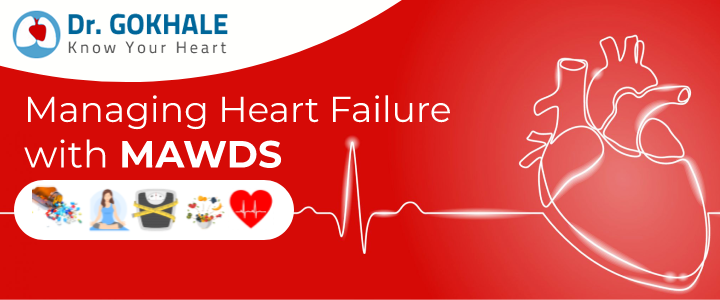Many hospitals and doctors are of the thought that heart failure is a chronic condition and that complications of heart failure can be managed by making transformations and changes in lifestyle under the assistance of a healthcare professional or team and doesn’t always have to lead directly to operations.
What does MAWDS stand for?
M- Medication
A- Activity
W- Weight
D- Diet
S- Symptom
- Medication -take them on time
The main aim of the inclusion of medicines is to improve the level of side effects of heart failure or reduce their negative impact that will lead to the prevention of further progression of the condition. After completion of diagnosis of a weak heart muscle, doctors specify certain medications that help to gain its strength back, cause a reduction in the fluid retention and increase the quality as well as survival rate.
It is of importance that you plan and organise your timing for medication and avoid skipping doses. This is even more important when you are feeling better. You might feel better for a temporary amount of time but that does not mean your treatment has stopped. You need to continue it for the time duration prescribed by the doctor.
Try to find ways to remind yourself to take medicines by using pillboxes or alarm clocks. Try to keep them close to you so that you know you have to take them. You can also make a list of the medications taken so that you can take them to your future appointments and ask for changes in the same.
- Activity
People who have been diagnosed with heart failure are recommended to exercise daily. If you are active daily, you will be able to maintain your body strength, your heart condition and improve the level of symptoms, but do not start with very complex exercises. Start with basic moves and this will help to build stamina gradually.
Due to weakness, some people might feel tired just a few minutes after beginning but continue slowly at your pace for health improvement. The most basic form you can start with is walking, but you can also go for other activities such as cycling, bike riding or swimming. If you are showing warning symptoms, you need to stop exercising.
- Weight
Weigh yourself every morning and keep a note of it. This habit is very important because you need to keep a check if you notice any sudden increase or reduction in your weight. This will be an indicator of fluid retention or loss in the body. The main goal is to lose weight without resulting in fluid retention. Doctors prescribe water pills or certain diet recommendations for this purpose.
- Diet
In general, a clean diet is recommended. Doctors are also advised to eat smaller portions and opt for healthy meals. Make adjustments regarding-
- salt- you are supposed to consume less than 2 grams and try to avoid processed or packaged food due to the high amount of salt usage.
- Fluids- you can drink about 2 litres or 8 glasses of water in a day. This is even more significant if you are on water pills.
- Drinking alcohol should be strictly prevented as it leads to weaker heart muscles.
- Symptoms
You need to understand what sort of symptoms you can observe if you are diagnosed with heart failure. The basic ones are shortness of breath, tiredness, swelling in the legs and chest pain. If you notice any of these, contact your doctor and ask for a medical evaluation. It can be nerve-racking but do not avoid it as early treatment can increase the chances of improvement.
Dr Gokhale is a heart surgeon in Hyderabad and has been known for his medical services for a very long time. He is well known among cardiothoracic surgeons all over the world. Visit his clinic for any difficulties related to the heart.













